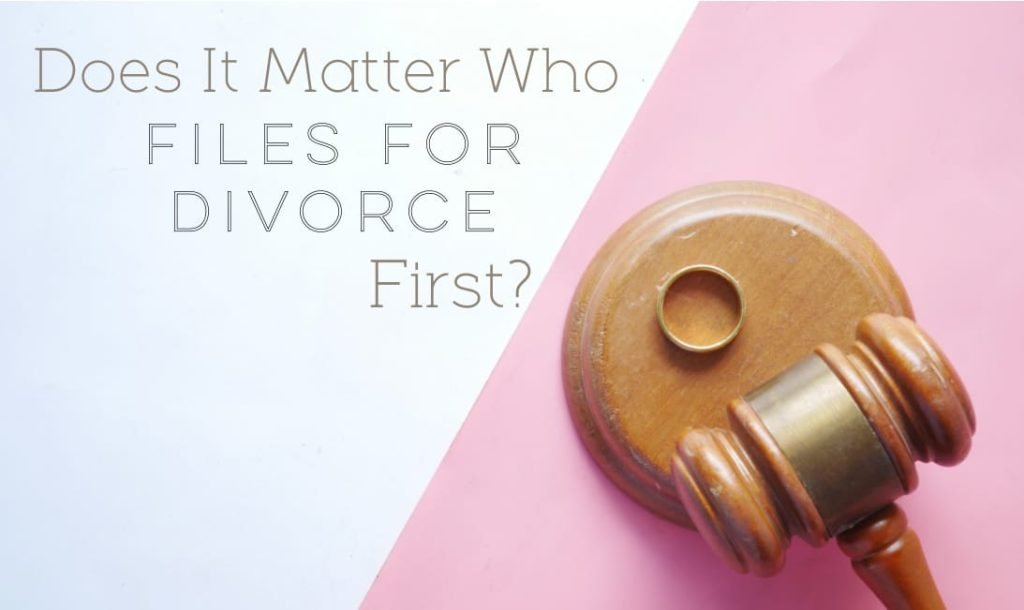
Does It Matter Who Files for Divorce First? What You Really Need to Know
Many people lie awake at night wondering: does it matter who files for divorce first?
You might hear friends say, “You have to file first if you want to win.” Others say it does not matter at all. The truth sits somewhere in the middle. Sometimes filing first can give you small legal or emotional advantages. Other times, it makes little or no difference.
This guide walks through when filing first can help, when it usually does not, and how to think about your own situation. The tone here is calm, practical, and supportive, so you can feel a bit more grounded in a stressful time.
Laws are different in every state, and sometimes even from one county to the next. This article gives general information only, not legal advice. For advice on your case, talk with a family law attorney in your area.
https://www.youtube.com/watch?v=9vFUypnjjWA
What It Means to File for Divorce First (And What It Does Not Mean)

Photo by Karola G
Filing for divorce first simply means you are the person who starts the court case. You turn in the first set of divorce papers to the court and pay the filing fee. That is all it means.
It does not mean the court thinks you are more honest, more hurt, or more right. It does not mean your spouse is the one at fault. The court looks at facts, documents, and state law, not who walked into the clerk’s office first.
Both spouses still have legal rights. Both spouses still have a chance to tell their side of the story. Filing first does not lock in who gets the house, the money, or the kids.
In many divorces, the person who files first feels a little more in control at the start. The other spouse may feel caught off guard or scared. Those feelings are real, but they do not decide the final result.
Courts aim for fair results based on the law. Judges care about safety, honesty, and the best interest of any children. Who hands in the first piece of paper is only one small detail in a much bigger picture.
Basic divorce terms: petitioner, respondent, and filing
You will see some legal words in divorce documents. They sound cold, but they are simple once you break them down.
- Petitioner: This is the person who files first. Some states use the word “plaintiff” instead. It just means the spouse who starts the case.
- Respondent: This is the other spouse. Some states use the word “defendant.” It means the spouse who has to respond to the petition.
The first paper that starts the divorce is often called a petition or a complaint. It usually includes:
- Basic information about the marriage (names, date of marriage, children)
- A request to end the marriage
- Requests about how to divide property and debts
- Requests about child custody and parenting time
- Requests for child support or alimony (spousal support), if needed
The words can change from state to state, but the idea is the same. One person files, the other responds, and both get to speak.
What filing first does not do in most divorces
There are many myths about being first to file. Here are some common ones that are usually wrong:
- Filing first does not prove who caused the breakup.
- Filing first does not show you are a better parent.
- Filing first does not guarantee more money or full custody.
- Filing first does not wipe out your spouse’s rights.
Judges are used to people trying to “beat” each other in court. They know that the first person to file is not always the most honest or the most hurt. They look at evidence, behavior, and the law.
In most cases, both sides will file their own paperwork, share documents, and tell their story. The judge will then decide based on what is fair and what is best for the children, not based on who started the case.
How state laws and local court rules change the picture
Every state has its own divorce rules. Some are community property states, where most property gained during the marriage is split 50/50. Others are equitable distribution states, where the court aims for a fair split that might not be exactly half.
Local court rules can also affect timing, deadlines, and the kind of forms you must use. These rules can change how helpful it is to file first in your area.
Because of this, the impact of filing first can be a little different from state to state. In some places, filing first might help with choice of county. In others, it may not matter much at all.
For real answers about your state, talk with a local family law attorney or check your state court’s website.
When It Can Help To Be the One Who Files for Divorce First
Filing first does not give you magic powers, but it can offer some small advantages. These can be emotional, practical, or legal.
Think of filing first like being the person who puts the first move on a chess board. It does not guarantee you win, but you do get to shape the early flow of the game.
You control the timing and choice of court
The person who files first usually picks when to file and, if there is a legal choice, where to file.
If you and your spouse live in the same county, this is simple. You file where you live. If you live in different counties or different states, the first person to file may choose the court, as long as residency rules are met.
This can matter because:
- Filing in your home county can reduce travel and days off work.
- You may know local judges or rules better through your lawyer.
- The court calendar in one county might be faster than another.
You cannot just pick any state. Most states have residency rules, such as living there for a certain number of months before you can file. An attorney can tell you what applies in your situation.
You have time to prepare documents and evidence
If you plan to file first, you can use that time to get organized. This can lower stress and help you make clearer choices.
You can:
- Gather bank statements, tax returns, and pay stubs
- Copy retirement account statements and mortgage papers
- Make a list of debts, like credit cards and loans
- Think about a parenting plan that feels fair and stable
Meeting with a lawyer before anything is filed can help you understand your options. You can talk through property, possible support, and time with the kids before deadlines begin.
When you are the respondent, you might feel rushed. You get served with papers, and a clock starts ticking. That can be hard if you are in shock or do not have money handy for a lawyer.
You may ask the court for early temporary orders
In many cases, the person who files first is the one who also asks for temporary orders. These are short term rules that apply while the divorce is pending.
Temporary orders can cover:
- Who lives in the family home
- Who pays which bills
- Child custody and parenting time
- Child support
- Temporary spousal support
These orders can shape the early pattern of life after separation. For example, if one parent has most of the time with the kids under a temporary order, that schedule can sometimes influence the final plan.
This does not mean temporary orders are permanent. Courts can change them. But starting off with a stable setup that works for you can help. Filing first gives you a chance to ask for that structure right away.
You might gain an emotional sense of control and safety
Divorce is not just legal paperwork. It is grief, fear, anger, and sometimes relief, all at once.
For many people, filing first brings a feeling of control. You are not waiting for the other shoe to drop. You are taking a clear step.
This can be especially important if:
- Your spouse is controlling or emotionally abusive
- You have lived with threats like “I will ruin you in court”
- You feel stuck, scared, or frozen
Starting the process can feel like you are choosing your path instead of being dragged along. Emotional benefits may not show up in a court order, but they matter for your health and your ability to parent and work.
Special cases where filing first can protect you
There are some situations where filing quickly can offer real protection. For example:
- You think your spouse might move money or drain accounts
- You fear your spouse may move out of state with the children
- You are worried about property being sold or hidden
- You need a restraining order for safety
In some states, filing for divorce triggers automatic orders. These are rules that tell both spouses not to move kids out of state, not to cancel insurance, and not to sell or hide big assets without agreement or court approval.
Filing first can put those rules in place as soon as possible. That can lower the risk of harmful moves in the early days of separation.
If you feel unsafe or there is violence, talk with police, a domestic violence advocate, or a local shelter. Divorce papers alone may not be enough to protect you. Safety planning comes first.
When It Usually Does Not Matter Who Files for Divorce First
In many everyday divorces, the person who files first does not get a better legal result. Judges care more about fairness, honesty, and the kids’ needs than about timing.
So if your spouse already filed, try not to panic. You still have rights. You still have a voice.
Property division and debt: judges look at fairness, not who filed
Courts usually divide marital property and debts using the rules in that state. That includes wages earned during the marriage, savings, homes, cars, and debts taken on for the household.
In community property states, the starting point is often a 50/50 split. In equitable distribution states, the court looks at what is fair based on several factors.
Either way, the judge does not say, “You filed first, so you get more.” The focus is on:
- What property is marital vs separate
- Each spouse’s needs and income
- The length of the marriage
- Any agreements, like a prenup
The same basic rules apply whether you filed first or responded.
Child custody and parenting time: best interest of the child comes first
For any case with children, judges must look at the best interest of the child. This is a legal standard that puts kids’ needs at the center.
Courts may look at:
- Each parent’s bond with the child
- The child’s routine, school, and community
- Each parent’s mental and physical health
- Any history of abuse, neglect, or substance use
- How well each parent supports the child’s relationship with the other parent
Being the first to file does not make you the “default” main parent. Your actions during the case usually matter more. That includes staying child focused, following court orders, and keeping kids out of adult conflict.
Child support and alimony: based on income and need, not filing order
Child support and spousal support (alimony) are usually set based on:
- Each parent’s income
- The number and age of the children
- Parenting time schedules
- Basic needs and living costs
- State guidelines or factor lists
Many states use formulas or worksheets. The numbers and facts you put on those forms affect the result far more than who filed first.
If your spouse filed and asked for support, you can still present your own numbers and documents. The court will look at both sides.
Most cases settle through agreements, not fights over who filed
A large number of divorces end in settlement, not in a long trial. Spouses may use:
- Lawyer negotiation
- Mediation
- Collaborative divorce
In these settings, both sides sit down to work out terms. You trade proposals, adjust, and sign an agreement that becomes part of the final order.
In a settlement focused case, filing first matters less than:
- How willing each person is to compromise
- How honest each person is with money and information
- How much each person wants to protect the kids from conflict
Your attitude and your support team often shape the outcome more than whether you were the first or second person to file.
How To Decide Whether You Should File for Divorce First
The question is not just “Does it matter?” It is also “What is best for me and my family right now?”
Here are some ways to think through your choice.
Questions to ask yourself before filing first
Before you rush to the courthouse, pause and check in with yourself. Some helpful questions:
- Are you physically and emotionally safe at home?
- Have you tried counseling, a trial separation, or other help, if that feels right?
- Do you have access to money for food, housing, and a lawyer, if needed?
- Do you have copies of key papers, like IDs, bank statements, and tax returns?
- Are you ready for the emotional and financial stress that often comes with divorce?
There is no perfect time to end a marriage. Still, taking a moment to reflect can help you act with a clear head instead of pure fear or anger.
When it may be better to wait and respond instead
Sometimes, it may help to wait and respond instead of rushing to file first.
Waiting could make sense if:
- You need time to save money for rent or legal fees
- You want to gather more information about finances
- You and your spouse are trying mediation or counseling
- Your spouse has already said they plan to file soon
If your spouse files first, do your best not to ignore the papers. There is usually a deadline to respond. Missing that deadline can hurt your case, and the court might move forward without your side of the story.
Responding on time, even if you feel shocked or angry, protects your rights.
Why talking to a family law attorney early is so important
A short meeting with a family law attorney in your area can give you a clearer picture than any article.
A local attorney can:
- Explain how your state handles property and support
- Tell you if filing first might help in your specific county
- Flag any safety issues that need quick action
- Help you think through a plan for kids and money
Many family lawyers offer a free or low cost first consult. Even if you cannot afford full representation, that one meeting can help you avoid big mistakes.
You do not have to decide or file on the spot. You can use what you learn to make a calmer choice about when and how to move forward.
Planning for safety, money, and kids before you file
Whether you plan to file first or respond, some basic planning can make the process a bit less scary.
You can:
- Create a simple budget: List your income and main monthly bills.
- Copy key documents: Tax returns, pay stubs, bank and credit card statements, mortgage or lease, car titles, insurance.
- Think about the kids’ routine: School, activities, medical needs, and a parenting schedule that keeps things stable.
- Plan for safety: If there is any risk of violence or revenge, talk with a counselor, attorney, or local domestic violence group about a safety plan.
Support does not have to come only from lawyers. Therapists, support groups, trusted friends, and faith leaders can all help you stay grounded while you move through this major life change.
Conclusion: Filing First Can Help, But It Does Not Decide Everything
Filing for divorce first can give you some advantages, such as control over timing, a chance to prepare, and the ability to ask for early temporary orders. It can also bring an emotional sense of control in a painful season.
At the same time, it does not guarantee you more money, more time with your kids, or a better overall result. Courts aim for fairness with property and support, and they focus on the best interests of children, no matter who filed the first paper.
If your spouse already filed, you have not “lost.” If you have not filed yet, do not rush just to be first without a plan. Focus on safety, information, and steady support.
The next smart step is to speak with a family law attorney or another trusted professional in your state. Ask how your local rules work and what makes sense for your life. You do not have to go through this alone, and you deserve a path that protects you and your family as you move into the next chapter.